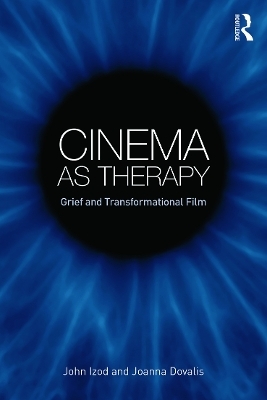
Cinema as Therapy
Grief and transformational film
Seiten
2015
Routledge (Verlag)
978-0-415-71868-4 (ISBN)
Routledge (Verlag)
978-0-415-71868-4 (ISBN)
This book fills a gap in work on the conjunction of grief, therapy and cinema and explores how emotional life can be stirred at the movies.
Loss is an inescapable reality of life, and individuals need to develop a capacity to grieve in order to mature and live life to the full. Yet most western movie audiences live in cultures that do not value this necessary process and filmgoers finding themselves deeply moved by a particular film are often left wondering why. In Cinema as Therapy, John Izod and Joanna Dovalis set out to fill a gap in work on the conjunction of grief, therapy and cinema.
Looking at films including Million Dollar Baby, The Son’s Room, Birth and The Tree of Life, Cinema as Therapy offers an understanding of how deeply emotional life can be stirred at the movies. Izod and Dovalis note that cinema is a medium which engages people in a virtual dialogue with their own and their culture’s unconscious, more deeply than is commonly thought. By analysing the meaning of each film and the root cause of the particular losses featured, the authors demonstrate how our experiences in the movie theatre create an opportunity to prepare psychologically for the inevitable losses we must all eventually face. In recognising that the movie theatre shares symbolic features with both the church and the therapy room, the reader sees how it becomes a sacred space where people can encounter the archetypal and ease personal suffering through laughter or tears, without inhibition or fear, to reach a deeper understanding of themselves.
Cinema as Therapy will be essential reading for therapists, students and academics working in film studies and looking to engage with psychological studies in depth as well as filmgoers who want to explore their relationship with the screen. The book includes a glossary of Jungian and Freudian terms which enhances the clarity of the text and the understanding of the reader.
Loss is an inescapable reality of life, and individuals need to develop a capacity to grieve in order to mature and live life to the full. Yet most western movie audiences live in cultures that do not value this necessary process and filmgoers finding themselves deeply moved by a particular film are often left wondering why. In Cinema as Therapy, John Izod and Joanna Dovalis set out to fill a gap in work on the conjunction of grief, therapy and cinema.
Looking at films including Million Dollar Baby, The Son’s Room, Birth and The Tree of Life, Cinema as Therapy offers an understanding of how deeply emotional life can be stirred at the movies. Izod and Dovalis note that cinema is a medium which engages people in a virtual dialogue with their own and their culture’s unconscious, more deeply than is commonly thought. By analysing the meaning of each film and the root cause of the particular losses featured, the authors demonstrate how our experiences in the movie theatre create an opportunity to prepare psychologically for the inevitable losses we must all eventually face. In recognising that the movie theatre shares symbolic features with both the church and the therapy room, the reader sees how it becomes a sacred space where people can encounter the archetypal and ease personal suffering through laughter or tears, without inhibition or fear, to reach a deeper understanding of themselves.
Cinema as Therapy will be essential reading for therapists, students and academics working in film studies and looking to engage with psychological studies in depth as well as filmgoers who want to explore their relationship with the screen. The book includes a glossary of Jungian and Freudian terms which enhances the clarity of the text and the understanding of the reader.
John Izod is Emeritus Professor of screen analysis at the University of Stirling. He has published several books, including Screen, Culture, Psyche: A Post-Jungian Approach to Working with the Audience (Routledge). Joanna Dovalis is a marriage and family therapist with a doctorate in clinical psychology, specialising in grief work. She works in private practice in southern California, USA.
Introduction. Part One. Birth. Tsotsi. Million Dollar Baby. Part 2. Trois Couleurs: Bleu. Trois Couleurs: Blanc. Trois Couleurs: Rouge. Part 3. The Son’s Room. Spring, Summer, Autumn, Winter…and Spring. Morvern Callar. Approaching the Tree of Life. The Tree of Life. Envoi. Glossary. References. Index.
| Erscheint lt. Verlag | 26.1.2015 |
|---|---|
| Verlagsort | London |
| Sprache | englisch |
| Maße | 156 x 234 mm |
| Gewicht | 362 g |
| Themenwelt | Kunst / Musik / Theater ► Film / TV |
| Geisteswissenschaften ► Geschichte | |
| Geisteswissenschaften ► Psychologie ► Psychoanalyse / Tiefenpsychologie | |
| Medizin / Pharmazie ► Medizinische Fachgebiete ► Psychiatrie / Psychotherapie | |
| Sozialwissenschaften ► Kommunikation / Medien ► Medienwissenschaft | |
| Sozialwissenschaften ► Pädagogik ► Sozialpädagogik | |
| Sozialwissenschaften ► Soziologie | |
| ISBN-10 | 0-415-71868-6 / 0415718686 |
| ISBN-13 | 978-0-415-71868-4 / 9780415718684 |
| Zustand | Neuware |
| Haben Sie eine Frage zum Produkt? |
Mehr entdecken
aus dem Bereich
aus dem Bereich
vom Mythos zur Psychoanalyse des Selbst
Buch | Softcover (2023)
Kohlhammer (Verlag)
28,00 €
Grundlagen, Behandlungstechnik und Anwendung
Buch | Softcover (2022)
Kohlhammer (Verlag)
35,00 €
den Stand der Traumaverarbeitung erkennen und Behandlungsschritte …
Buch | Hardcover (2023)
Klett-Cotta (Verlag)
36,00 €


